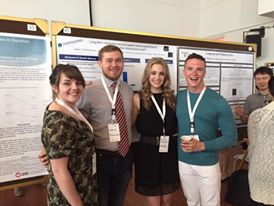Science of Mind Reading – PSYC 3007
PSYC 3007 WI001: Science of Mind Reading
Instructor: Dr. Darren Campbell

PSYC 3007 Syllabus -> Times, Locations, & Schedule
Email: darrenc@nipissingu.ca
Land Acknowledgement
Nipissing University sits on the territory of Nipissing First Nation, the territory of the Anishnabek, within lands protected by the Robinson Huron Treaty of 1850. We are grateful to be able to live and learn on these lands with all our relations.
Course Materials
Assigned readings, videos, instructions, etc. will be available through Blackboard (BB). Other resources will be available through Nipissing Library, Google Scholar, and other databases.
 Course Objectives and Content.
Course Objectives and Content.
In this course you evaluate the psychological factors that support accurately inferring people’s thoughts and feelings, general tendencies, and truthful or deceptive intent.
During class you will discuss, present, and write about verbal, non-verbal, and environmental signals that people use to infer others’ personality traits, thoughts, emotional states, and truthfulness or deception.
With the successful completion of this course, you will be able to:
- describe and evaluate modern models of the science of mind reading,
- evaluate verbal, non-verbal, and text-based measures of people’s mental states, and
- develop a written review and evaluation for a specific mind-reading research focus (Chapter 1) and your own proposed mind-reading measure (Chapter 2).
Basic Workload Expectations for Success
Basic preparation for seminar readings and discussions will require (on average) 3 hours per week outside of participating in the seminars. Completing the major course projects, such as the group paper presentation and writing the term paper will require additional time and effort. Success simply requires sustained effort and focused work. 🙂
| Evaluation | |
|---|---|
| Engage in Q&A during DC article reviews | 6% (best 6 of 8 articles, 1% each) |
| Engage with Group's Demo & Discussion | 4% (the other 4 Groups, 1% each) |
| Group Lead | 12% (4% Written, 4% Class Lead, 4% Group Demo) |
| Exam | 30% (closed book) |
| Peer Review | 4% (Feedback) |
| Attend Others' Oral Reports | 1% (both classes) |
| Term-Paper Oral Report | 3% (brief Presentation / Discussion) |
| 2 written sections for your term-paper | 14% (#1 - 4%, #2 - 10%) |
| Term Paper | 26% (Literature Review & Proposed MR Measure) |
Engage in Q&A (6%)
During instructor-lead article reviews, you demonstrate 1) a reading-based understanding of the articles and attend to and thoughtfully comment on the discussion issues.
Engage with Groups (4%)
During each Group’s review of an article, you 1) participate in the study demonstration activity (as a Target or Judge) and 2) thoughtfully respond to the discussion of the article.
 Group Discussion Lead & Methods Demo (12%)
Group Discussion Lead & Methods Demo (12%)
Each group develops a demonstration and discussion of an article. Before class, each member will submit their planned section comments (4%). During class, each member will summarize, comment on, and raise questions for their section discussion (4%). As a group, students will demonstrate the key mind-reading assessment process and engage classmates in the process (4%). More details will follow.
Exam (30%) Based on the course readings and in-class discussions, you will answer a series of questions in a closed-book format.
Attending Classmate’s Oral Reports (1%) You can develop insights into your own term-paper by listening to other classmates’ reports. For full marks, you must attend both oral-report classes.
Term-Paper Oral Report (3%) You will provide a brief (5-7 minutes) description of your term-paper topic, findings, and proposed mind-reading measure. This will be followed by a brief Q&A session.
2 Term-Paper Draft sections (14%) You will create two written sections for your final term paper. For draft 1, you will describe your topic, research question, and summarize and evaluate one research article. For draft 2, you will revise Section 1, summarize and evaluate 3 additional research articles, and develop a Mind-Reading measurement section, which critiques the prior Mind-Reading (M-R) measures and proposes an improved M-R measure. More details will follow.
Peer-Review (4%) Your will complete a focused review of a classmate’s preliminary Draft 2.
Final Review & Measurement Paper (30%) Based on one of the term-paper topics and readings, you will: 1) write a focused literature review (Chapter 1) and 2) critique the available mind-reading measures and propose a new measurement approach to address these critiques (Chapter 1). Details will follow.

Lecture Schedule and Important Dates
See Fall2024_In-Person Syllabus for specific dates and times [ Page 4 ]
| Schedule and Important Dates | |||
|---|---|---|---|
| Week / Date | Reading and Discussion Topics | Due Date | |
| 1 | Admin | Topic Highlights | |
| 2 | Trait 1 Good Ts + Essays | Trait 2 Good Ts + Facebook | |
| 3 | EA 1 DIP Couple Conflict | EA 2 Concern vs Contagion | |
| 4 | Lie 1 F2F vs Online | Lie 2 CTP - P300 | Draft 1 |
| 5 | Group 1 Trait (# Insta) | Draft 1 Review | |
| 6 | Group 2 EA (Age + Cues) | EA 3 (Brain Systems) | |
| Family Day & Study Week | |||
| 7 | Group 3 Lie (VA Details) | Lie 3 (Failure to Forget) | |
| 8 | Group 4 Trait (1st Dates) | Group 5 Lie (fMRI) | |
| 9 | Themes & Highlights | Closed Book Exam | |
| 10 | Post-Exam Review | Oral Reports: Set 1 | Draft 2 |
| 11 | Oral Reports: Set 2 | Peer-Review Discussions | Peer-Review |
| 12 | Overall Themes | Summary & Implications | |
| Final Term-Paper | Final |
Fair Behaviour and Respect for Others![]()
We all prefer a positive environment that supports learning and fair evaluations. Disruptive or negative behaviour is not helpful.
Please read this Code of Student Rights and Responsibilities.
Student Support Resources
If you find yourself struggling academically or with mental health problems, Student Development Services (SDS) at Nipissing University has many supports available to you (go here or email mailto:sds@nipissingu.ca).
+ Student Retention Alert is a referral system to identify academic progress or well-being concerns and connect students to support services on campus. For more information: www.nipissingu.ca/nusuccess or email mailto:nusuccess@nipissingu.ca
Nipissing Library Resources
The library offers excellent resources and services which make completing assignments and writing papers easier, more efficient, and better in quality. I encourage you to use them (follow this link).
Academic Integrity
The more effort you put into your education and experiences at Nipissing University, the more you will get out of them. Cheating and Plagiarism are not just unethical with serious consequences (see link), they undermine your ability to develop life-long time-management strategies, coping skills, and, of course, specific course knowledge and insights.
Intellectual Property
All materials developed for this course, including, but not limited to, lectures (in-person or video versions), lecture notes and slides, assignments, examinations, and syllabi, that are provided in class or online, are the intellectual property of the course instructor. Posting, providing, sharing, or selling unauthorized audio, video, or textual material violates an instructor’s intellectual property rights, the Canadian Copyright Act, and may violate the rights and privacy of others in the classroom. Failure to follow these instructions is in contravention of the university’s Code of Student Rights and Responsibilities. Participation in this course constitutes an agreement by all parties to respect the intellectual property and privacy of others during and after their association with Nipissing University.

